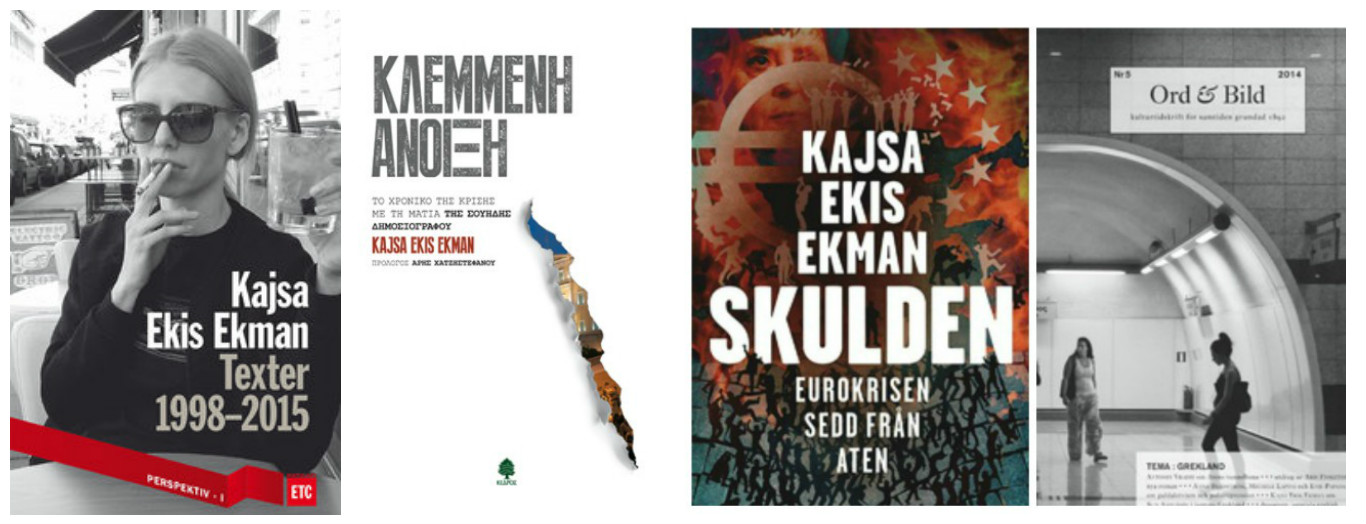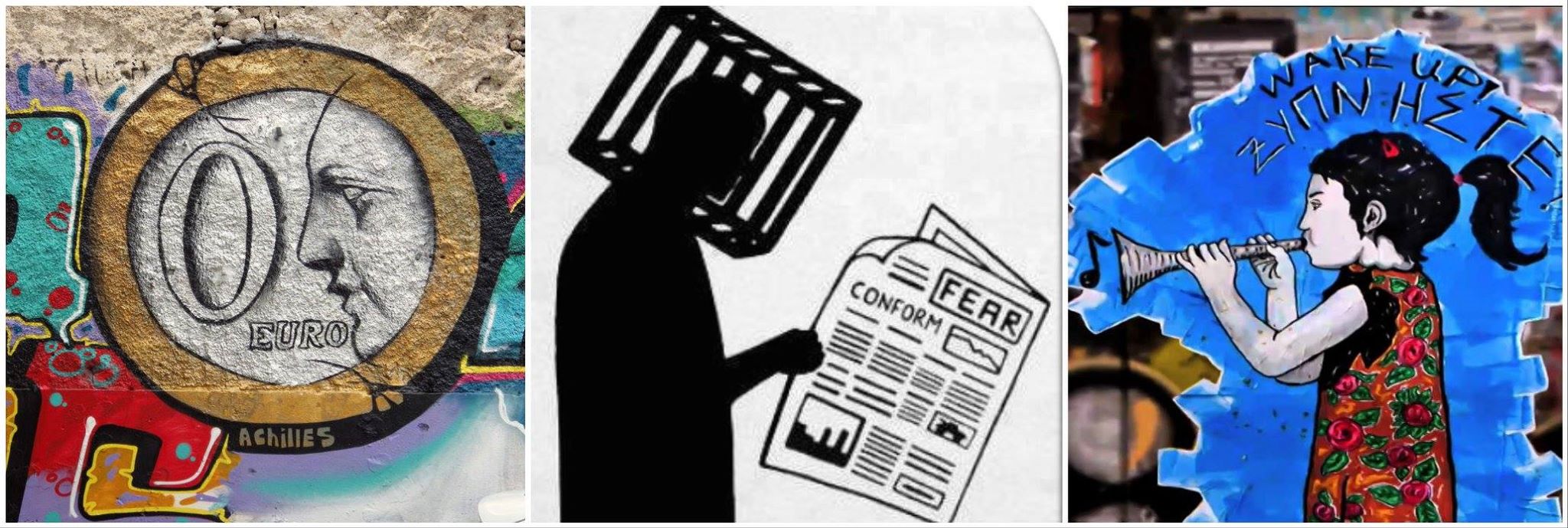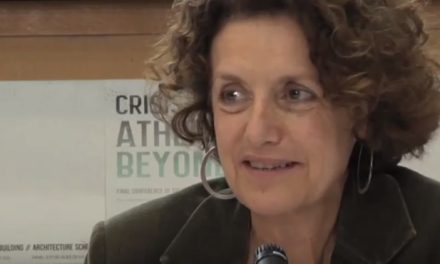Kajsa Ekis Ekman is a Swedish journalist, writer and activist. She is the author of several works and books about the financial crisis, democracy and women’s rights; She writes for the major Swedish daily Dagens Nyheter and is an op-ed columnist at the leftwing daily ETC.
In 2013, her book “Skulden, Eurokrisen sedd från Aten” (“The Debt/The euro crisis as seen from Athens”) was published in Swedish. It is worth noting that “Skulden” is not only the word for debt but also denotes guilt (as it is also the case with theGerman word Schuld), which is why the Swedish title cannot be directly translated into English. This is why a different title was given to the book when it was later translated and published into Greek. The title chosen for the Greek version of the book was “Stolen Spring” (“Κλεμμένη άνοιξη – Το χρονικό της κρίσης”), a title that was inspired by Stratis Tsirkas’ book ”Lost Spring”.
Kajsa Ekis Ekman spoke to Rethinking Greece* about her book in which she attempted to break the hegemony of the Greek exceptionalism discourse that was prominent in northern European circles, especially in the first years of the euro crisis. She also shared her views on the current policies applied to address the crisis in Europe and talked about her solidarity initiatives for Greece, as well as for being proclaimed “Greek-Swede of the year 2015”.
Since the outbreak of the euro crisis, you have written a series of articles on Greece, as well as a book. What was it that motivated you to focus on the Greek case?
Greece emerged as the center of protest against austerity measures in 2011. From the Aganaktismeni’s (Indignant Citizens Movement) spontaneous square meetings at Syntagma and other squares all over the country to general strikes and a resurgence of the Left, people showed that they would not silently accept being reduced to a debt colony. This impressed me and when I was contacted by friends in Greece who told me what was happening, I decided to come and write about what I saw. I ended up going back and forth for three years. I learned so much. Not only about the political developments, it was like studying history unfolding live, but I also made many friends.
Through your articles and book, you invited the public to “rethink Greece” by casting doubt on the view that the euro crisis was triggered by lazy retirement-seekers, an idea which was prominent in northern European circles (political and journalistic), especially in the beginning of the crisis. Can you elaborate more on your research/work with regard to this issue?
When I arrived in Greece in 2011, the effects of the austerity measures had not become tangible yet. What angered people was rather how they were depicted in the European press. The worst was the German press and Bild in particular. But Swedish media also spread a light version of the “Greek freak show” talking about hospitals with 50 gardeners and no garden, workers retiring at 40 and having luxury lives, and our biggest newspapers wrote that Greeks “took it easy under olive trees and drank coffee all day.” I have been doing investigative journalism for 13 years but to debunk this myth took me 15 minutes. Just looking at statistics from Eurostat, ILO, OECD and others showed that Greeks actually work more hours than the average European. Productivity is lower, that is true, but this depends rather on the nature of the Greek industry which is not so technologically advanced as the central or northern European heavy industry. This has nothing to do with the workers themselves! Why did this myth spread anyway? How come nobody fact-checked their articles? I don’t know. Either the journalists themselves are lazy. Or truth is inferior to hegemony. When the troika was preparing the way for austerity, this had to be explained to the average non-Greek as “they have been living over their means, they now need to cut down and this is fair”. How else could you justify the austerity measures?
 In your view, how has the image of Greece in Northern Europe been affected in conjunction with the scapegoating and the dissemination of over-moralizing narratives related to the Greek society’s characteristics? Has the public debate changed towards a fairer direction after six years of economic and political crisis?
In your view, how has the image of Greece in Northern Europe been affected in conjunction with the scapegoating and the dissemination of over-moralizing narratives related to the Greek society’s characteristics? Has the public debate changed towards a fairer direction after six years of economic and political crisis?
I would say that in 2013 the idea had changed. We now heard less about the lazy Greek and more about the humanitarian crisis that was taking place. I now think that at least people in Sweden have understood what is really going on. What really made it clear was the referendum in 2015, when people clearly voted no to austerity and were deceived by the government. Many voices were heard saying that this move was antidemocratic. The chief economist of one of the biggest Swedish trade unions wrote a report on Greece stating that debt ought to be cancelled. But of course since last fall, the refugee discussion has been the predominant one when speaking of Greece, we now hear very little on the economic situation if anything.
In 2013, you initiated a call for solidarity for Greece through an open letter that was signed by 22 prominent personalities of Sweden, published in the top- selling daily newspaper “Dagens Nyheter” under the title “Austerity policy must stop before it is too late”. What could be an alternative way to exit the euro crisis, according to your opinion? Do you consider that Scandinavia can serve as a model for mixed economy welfare state and prosperity that Europe should pursue?
My opinion is that when a country enters an economic program (I am referring to the troika) with 13% unemployment and 120% debt and after five years has 29% unemployment and 180% debt, then this program has clearly not served its purpose. Then why continue with it? There is no logic at all. The troika program has been an economic catastrophe and a human disaster for Greece. It should be ended now. There is no point in deceiving the public by calling it “the institutions” when it’s still the same thing. The longer it goes on, the worse.
 Now the Scandinavian welfare model is another, bigger discussion. Many people in Greece have an idea of it which relates back to the 70’s when in fact Scandinavia has changed a lot and is no longer the social democratic paradise it once was. In some aspects such as privatization of education, electricity and railways, we are more neoliberal than Greece. Yet I think one of the reasons why Sweden, for example, still has managed to keep a relatively good standard of living is that we voted no to the euro in a referendum in 2003. Finland, with the euro, is doing a lot worse. Norway is in great shape and is not even an EU member. At the end of the day, if the EU was pressing Greece with the euro as their weapon, there is no reason to be scared of dropping it. The euro is not a magic ticket to the VIP club. It simply means that control over the money is not in the country’s own hands. If you don’t control your money, you are not independent, you can only ask for mercy from the bankers. And I think that in Greece, having studied its history, there is this double sentiment. The quest for independence which clearly is a red thread throughout history, from Kolokotronis to Metaxas “Oxi” and Aris Velouchiotis, but also the fear of loneliness which leads the country to jump from one superpower to another in the hunt for allies. And I think in July last year, these two tendencies clashed. Many Greeks want to be independent AND have the euro and unfortunately it is not possible at the moment.
Now the Scandinavian welfare model is another, bigger discussion. Many people in Greece have an idea of it which relates back to the 70’s when in fact Scandinavia has changed a lot and is no longer the social democratic paradise it once was. In some aspects such as privatization of education, electricity and railways, we are more neoliberal than Greece. Yet I think one of the reasons why Sweden, for example, still has managed to keep a relatively good standard of living is that we voted no to the euro in a referendum in 2003. Finland, with the euro, is doing a lot worse. Norway is in great shape and is not even an EU member. At the end of the day, if the EU was pressing Greece with the euro as their weapon, there is no reason to be scared of dropping it. The euro is not a magic ticket to the VIP club. It simply means that control over the money is not in the country’s own hands. If you don’t control your money, you are not independent, you can only ask for mercy from the bankers. And I think that in Greece, having studied its history, there is this double sentiment. The quest for independence which clearly is a red thread throughout history, from Kolokotronis to Metaxas “Oxi” and Aris Velouchiotis, but also the fear of loneliness which leads the country to jump from one superpower to another in the hunt for allies. And I think in July last year, these two tendencies clashed. Many Greeks want to be independent AND have the euro and unfortunately it is not possible at the moment.
Sweden has been traditionally following an open-door policy to immigrants. However, added to the existing strains of austerity, the escalation of the ongoing refugee crisis puts further economic and political pressure to Europe. How could one rethink the refugee crisis in these challenging times?
Oh I don’t know. This is not my topic. There are experts who have studied this matter and I have not. The only thing I have to say is this: If the world powers would stop invading countries in the Middle East and Central Asia all the time, the number of people on the run would surely drop.
You are a founding member of the “Network for Greece” organization in Sweden. Can you tell us more on this initiative and its actions?
We are not tied to any political party, the organization is for anyone wanting to express solidarity. We have five aims. Stop austerity; People before profits; Give the youth work and future in Greece; Solidarity with everyone living in Greece i.e. no to fascism and racism; and cancelling of the debt. What we do is to organize seminars, to inform Swedes on what’s going on, we hold demonstrations and we invited Aris Xatzistefanou to show his movies here. Members are both Greeks who lived here since the 60’s and those who came recently, Swedes who have been to Greece a lot and have ties to the country, and anyone with an interest in economy. Among our members are also the former ambassador to Greece Krister Kumlin.
 You were recently proclaimed as “Swede-Greek of the year 2015” by the “Committee for cultural exchange between Sweden and Greece”. What does this mean to you? What, in your opinion, are the bonds between Greece and Sweden; how much do the two countries have in common?
You were recently proclaimed as “Swede-Greek of the year 2015” by the “Committee for cultural exchange between Sweden and Greece”. What does this mean to you? What, in your opinion, are the bonds between Greece and Sweden; how much do the two countries have in common?
Yes I was very honoured for that prize! Especially as I received it from Theodor Kallifatides who is a great author and has done so much for the relationship between the two countries. I think the relationship goes way back. Not only since many Greeks came here in the 60’s and worked in the industry and the first Swedes started going on charter in the 70’s, but remember up until the 70’s all Swedes who went to college had to study ancient Greek – the language – it was a requisite. The two countries also have in common the fact that they are small and obsessed with what the world thinks about them. If there is a Swede or a Greek who makes it in Hollywood we always have to point it out: “Look! That’s someone from my country!” A British or American never screams that when they see a countryman on TV. We also tend to think we are unique and start sentences like “in ALL other countries it’s that way, only in MY country it’s this way”. Another similarity is that since we are at the fringes of Europe, we talk about Europe as “the others.” We say we are going “to Europe” when in fact we are already in it.
* Interview by Eleftheria Spiliotakopoulou
See also: Kajsa Ekis Ekman’s blog (mostly in Swedish) & Kajsa Ekis Ekman’s book on Being and Being Bought, Prostitution, Surrogacy and the Split Self (2013)
Watch video: Everybody talks about capitalism — but what is it? | Kajsa Ekis Ekman | TEDxAthens (2015)
:
TAGS: CRISIS | ECONOMY & DEVELOPMENT | EU POLITICS | GLOBAL GREEKS | MEDIA | RECOVERY














